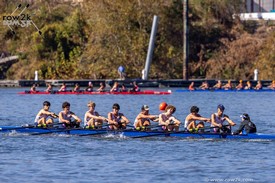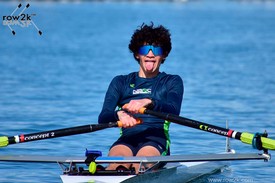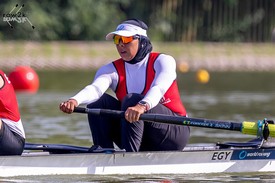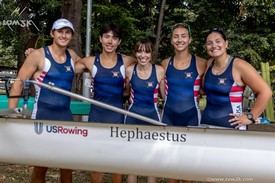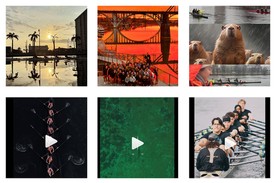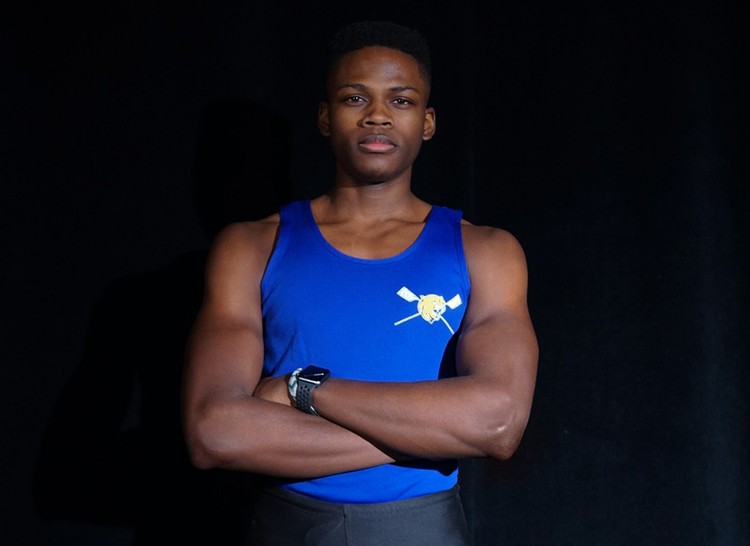
row2k spoke with Tymir Green-Ellis on his start in rowing, his experience as a black athlete and walk-on rower at Johnson & Wales in Rhode Island, on becoming a coach at Philadelphia City Rowing and BLJ Community Rowing, finding his voice and his community, how he was inspired by the athletes he coaches, and more.
row2k: How did you start rowing?
Tymir Green-Ellis: Throughout high school, I played volleyball and initially intended on attending a college with a Men's Volleyball program. In 2016, I went to Johnson & Wales University's Men's Volleyball team tryouts as a first year. I was cut from the Volleyball team after a month, as I did not pass their fitness test. Although I did not pass, I did not let this discourage me. I knew that I wanted to be a part of a team, but was very unsure which team I wanted to try out for. My options were cross-country and rowing, due to the fact that they typically take on a high amount of walk-ons who perform well within the programs.
Once I discovered how many miles a typical cross-country race is and compared that to how many miles I could run at the time, I decided to try rowing. I reached out to the coach at the time, Bill McLean, who now coaches at Washington College. He invited me to an all-team workout to get to know the team and provided a run down on the program, as well as expectations. Weeks later, I was put into a boat and loved it from that point on.

row2k: Do you want to talk about being a person of color walking on to a rowing team at a university in New England/Rhode Island?
Green-Ellis: Being a person of color who started as a novice walk-on was most difficult during my novice year, because I typically would only see one rower who resembled me at regattas. Though I was able to relate with my teammates when feeling the pain of a 2k, I still felt alone within the sport. I had to relive a different pain when carrying the boat out of the water, which was witnessing no POC within the huge crowds of people. This is a continuous thought within my head when all boats are aligning and I see no representation - unlike other sports such as track, basketball, and football to name a few, which have a high percentage of black athletes where there is a large amount of representation.
There have been cases where I have been discriminated against, when walking within regatta merch tents and carrying boats down to the river. I always could feel people staring at me, as if I wasn't supposed to be there. My team supported me within our environment but with the majority of them being non-POC, they did not understand the internal struggle I had. I have always refrained from being outspoken so I would not be stigmatized.

I began to see more diversity within the New England area during my junior year. This increase helped me feel more comfortable going to regattas and reassured me that the sport is slowly becoming more diverse. At regattas during my sophomore year, I was able to count how many POC I had seen on one hand. One year later, I was able to notice more diversity on the water. It's important to point out that I have seen more collegiate club teams in the New England area with diversity than varsity teams.
row2k: Do you have any favorite or distinct memories from your time rowing with the team?
Green-Ellis: My distinct memories stem from the spring of 2019. This is because many teammates were breaking personal records during the spring season. It was a great environment because of the immense energy, which motivated everyone to push themselves harder during each practice.
Since a majority of the races were in the New England area, my family members were only able to watch races via live streaming. My coach arranged for the team to race at the Kerr Cup Regatta and Mid-Atlantic Rowing Conference during that season, both of which are held in Pennsylvania. This meant a lot to me, as the majority of my family resides in the Pennsylvania area. My family was able to attend both regattas, which was huge to me because they were able to see me in action instead of on their televisions. These races were important to me because it allowed my family to learn more about the sport other than what they search online before streaming a race.
row2k: Since your graduation you have been coaching in Philadelphia; can you tell us how and why you got involved, and how it is going?
Green-Ellis: In the summer of 2018, I began coaching for Philadelphia City Rowing's Learn-to-Row Camp. This camp was composed of middle school and high school kids. I remember applying for the job and doubting that I was going to get the position. I distinctly remember this because I noticed that a lot of the staff members at Philadelphia City Rowing were better qualified, as they had longer experience within the sport. But they decided to take a chance on me, and this chance motivated me to work hard so that I can gain immense experience along with the other coaches at PCR.
In the summer of 2019, I began coaching at BLJ Community Rowing. This reshaped my reason for coaching and what I wanted myself and athletes to accomplish within the sport. As a black rower, I lived through the thought process that I was alone within this sport. It is quite satisfying to look back at the challenges I faced during my first year and how far I've come. I used to doubt myself significantly and now I am connecting with other black rowers within the Philadelphia rowing community. This community has made me feel welcomed in a sport that I initially felt excluded from.
I believe it is important for all rowers to want to strive to be fast and fit, but it is important to recognize what it is to be an oarsman/oarswoman. I believe that in such an elite sport, it is important to remain humble, respectful, and honorable. Being an oarsman or oarswoman takes more than just being fast and fit. As a coach and teammate, I strive to teach rowers how to remain humble. In such an elite sport, it is imperative to be respectful to not only fellow teammates, but those competitors.
row2k: Do you have any favorite stories or experiences from your time as a coach?
Green-Ellis: I recall a moment this past summer at BLJ Community Rowing. I was coaching St. Benedict's High School along with the coaches of the program, Craig White and Brannon Johnson. It was an unbelievable experience, because witnessing three eights and two fours on the water with mostly POC kids was amazing.
I can recall a time when I and another BLJ coach were rowing in a quad with two black varsity athletes from St. Benedict's who told me about their goals and accomplishments. It was unbelievable how much passion they had for the sport. This experience occurred around a time that I was battling depression and figuring out my reasoning for continuing to row.
That experience made me step back and reassess why I would like to continue competing and coaching within the sport. My motivation to strive for greatness comes from the will to motivate others who look like me and help them along their rowing journey in order to be the best athlete possible.
row2k: In your involvement with DEI efforts, is there anything specific that you felt was most important to you or that you brought to the conversation when you first became involved?
Green-Ellis: It is important for people to be willing to listen to POC stories and take notes on their experiences. For many years, POC rowers had to suffer in silence because of the fear of speaking out and being alienated by the rowing community. As many people may know, the sport attracts households of higher income who hold power in many clubs and collegiate teams. Colin Kaepernick was in a similar situation that most black athletes have to live with. Many black athletes tend to worry about being alienated from their sport if they speak on the topics of race.
My efforts to diversify the sport did not go into drive until quarantine began in March. During my time in college, I always prioritized health inequality within the black community, which was my passion since high school. I started to have a deeper understanding of the racial disparities within the sport. I was invited onto the Rowing in Color podcast and was able to connect with 100+ black rowers that I previously did not know existed before the podcast.
After the interview, I compared the conversations I have with my friends and family to the people I row with. I questioned if there was such a thing as to be "too outspoken" or "not outspoken enough" numerous times until I realized the amount of people I've had behind me along my journey. My parents have always instilled in me to always be true to myself and speak on the issues I care the most about.
row2k: How about since then, whether from your coaching or involvement with DEI and talking to folks - is there anything you have learned, that did or did not change in your thinking, that has become more/very important, or even that you think it would be useful for folks to know?
Green-Ellis: It is important for people to take small steps when diving into the DEI realm, and build from there. I think many teams and coaches should take a step back and realize their opportunities, as many POC have to work three times harder for them to still come up short in many situations. Teams and coaches should aim to notice the underlying issues and not point fingers at each other.
It is important for non POC rowers to utilize their privilege to help others. For many people, it may be uncomfortable for them to address their privilege, but in order to consider themselves as an ally, it is important for them to be mindful. Just as with hand sanitizer in 2020, creating these difficult conversations is necessary.
If you enjoy and rely on row2k, we need your help to be able to keep doing all this. Though row2k sometimes looks like a big, outside-funded operation, it mainly runs on enthusiasm and grit. Help us keep it coming, thank you! Learn more.
Comments | Log in to comment |
There are no Comments yet
| |
- Bont Rowing
- Calm Waters Rowing
- Concept 2
- Craftsbury Sculling
- The Crew Classic
- CrewLAB
- Croker
- Durham Boat Co.
- Empacher
- Faster Masters
- Filippi
- Fluidesign
- h2row.net
- HUDSON
- Live2Row Studios
- Nielsen-Kellerman
- Oak Ridge RA
- Peinert Boat Works
- Pocock Racing Shells
- Race1 USA
- RowKraft
- Rubini Jewelers
- Vespoli USA
- WinTech Racing
- Bont Rowing
- Calm Waters Rowing
- Concept 2
- Craftsbury Sculling
- The Crew Classic
- CrewLAB
- Croker
- Durham Boat Co.
- Empacher
- Faster Masters
- Filippi
- Fluidesign
- h2row.net
- HUDSON
- Live2Row Studios
- Nielsen-Kellerman
- Oak Ridge RA
- Peinert Boat Works
- Pocock Racing Shells
- Race1 USA
- RowKraft
- Rubini Jewelers
- Vespoli USA
- WinTech Racing






